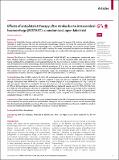Effects of antiplatelet therapy after stroke due to intracerebral haemorrhage (RESTART) : a randomised, open-label trial
Date
29/06/2019Metadata
Show full item recordAbstract
Background Antiplatelet therapy reduces the risk of major vascular events for people with occlusive vascular disease, although it might increase the risk of intracranial haemorrhage. Patients surviving the commonest subtype of intracranial haemorrhage, intracerebral haemorrhage, are at risk of both haemorrhagic and occlusive vascular events, but whether antiplatelet therapy can be used safely is unclear. We aimed to estimate the relative and absolute effects of antiplatelet therapy on recurrent intracerebral haemorrhage and whether this risk might exceed any reduction of occlusive vascular events. Methods The REstart or STop Antithrombotics Randomised Trial (RESTART) was a prospective, randomised, open-label, blinded endpoint, parallel-group trial at 122 hospitals in the UK. We recruited adults (≥18 years) who were taking antithrombotic (antiplatelet or anticoagulant) therapy for the prevention of occlusive vascular disease when they developed intracerebral haemorrhage, discontinued antithrombotic therapy, and survived for 24 h. Computerised randomisation incorporating minimisation allocated participants (1:1) to start or avoid antiplatelet therapy. We followed participants for the primary outcome (recurrent symptomatic intracerebral haemorrhage) for up to 5 years. We analysed data from all randomised participants using Cox proportional hazards regression, adjusted for minimisation covariates. This trial is registered with ISRCTN (number ISRCTN71907627). Findings Between May 22, 2013, and May 31, 2018, 537 participants were recruited a median of 76 days (IQR 29–146) after intracerebral haemorrhage onset: 268 were assigned to start and 269 (one withdrew) to avoid antiplatelet therapy. Participants were followed for a median of 2·0 years (IQR [1·0– 3·0]; completeness 99·3%). 12 (4%) of 268 participants allocated to antiplatelet therapy had recurrence of intracerebral haemorrhage compared with 23 (9%) of 268 participants allocated to avoid antiplatelet therapy (adjusted hazard ratio 0·51 [95% CI 0·25–1·03]; p=0·060). 18 (7%) participants allocated to antiplatelet therapy experienced major haemorrhagic events compared with 25 (9%) participants allocated to avoid antiplatelet therapy (0·71 [0·39–1·30]; p=0·27), and 39 [15%] participants allocated to antiplatelet therapy had major occlusive vascular events compared with 38 [14%] allocated to avoid antiplatelet therapy (1·02 [0·65–1·60]; p=0·92). Interpretation These results exclude all but a very modest increase in the risk of recurrent intracerebral haemorrhage with antiplatelet therapy for patients on antithrombotic therapy for the prevention of occlusive vascular disease when they developed intracerebral haemorrhage. The risk of recurrent intracerebral haemorrhage is probably too small to exceed the established benefits of antiplatelet therapy for secondary prevention.
Citation
RESTART Collaboration & Sullivan , F 2019 , ' Effects of antiplatelet therapy after stroke due to intracerebral haemorrhage (RESTART) : a randomised, open-label trial ' , Lancet , vol. 393 , no. 10191 , pp. 2613-2623 . https://doi.org/10.1016/S0140-6736(19)30840-2
Publication
Lancet
Status
Peer reviewed
ISSN
0140-6736Type
Journal article
Description
Funding: British Heart Foundation.Collections
Items in the St Andrews Research Repository are protected by copyright, with all rights reserved, unless otherwise indicated.

